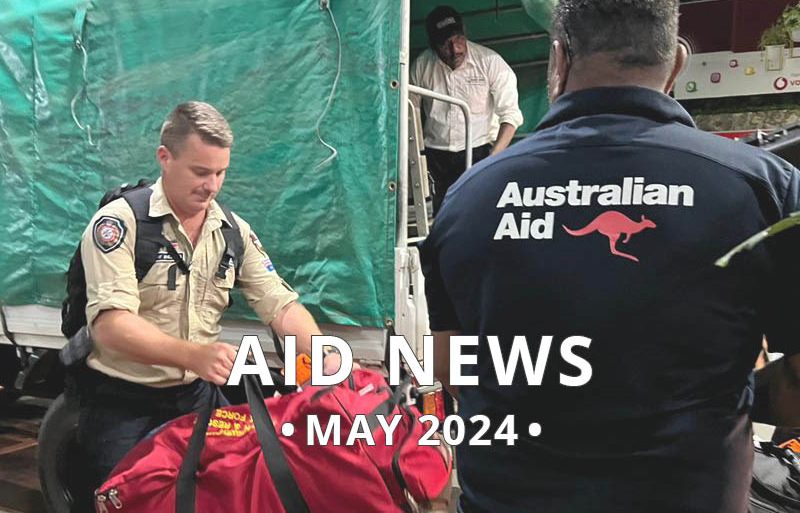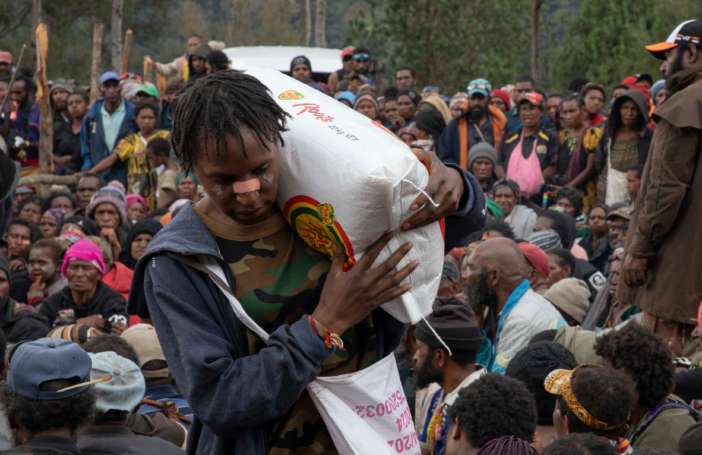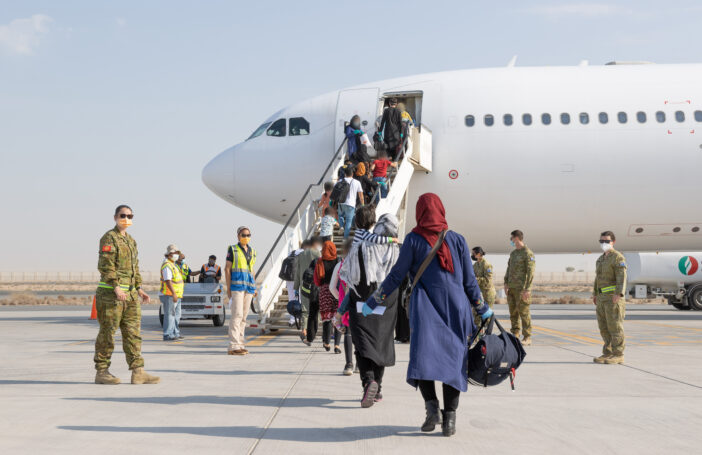Our monthly update of news and analysis on aid and international development, with a focus on Australian aid.
Australian aid
Australia has offered an initial humanitarian allocation of $2.5 million and defence logistics support to assist relief and recovery efforts following a devastating landslide in PNG’s Enga province on 24 May. Australia’s Disaster Assistance Response Team landed on 28 May. Estimates of those killed by the disaster range between 100 and 2,000, with thousands more likely displaced. CARE Australia and CARITAS Australia have launched emergency appeals to assist affected communities.
The May federal budget included a slight real increase in aid for 2024-25 and revealed that Australia’s development program is expected to reach just over $5 billion (in nominal terms) in 2025-26, a year ahead of schedule. The ODA/GNI ratio is expected to remain at 0.19% in 2024-25 before falling in the outyears.
Devpol’s analysis questioned the government’s claim of an aid “rebuild” and assessed geographic and sectoral funding allocations, as well as wider aid effectiveness trends. In addition to the blog, you can download the aid budget breakfast presentation. The Australian Aid Tracker has been updated with the new figures, as well as a new climate and gender spending tracker.
While acknowledging additional funding to meet global and regional climate finance commitments, ACFID concluded that “it’s hard to see how the ambition set out in the International Development Policy launched in August last year has gained any fiscal traction in shaping core development programming”. The development contractors’ peak body was more positive.
Analysts from the Lowy Institute noted that the joint ministerial press release didn’t specifically mention the small increase to aid and highlighted the government’s continued emphasis on off- budget (and less transparent) financing vehicles such as Export Finance Australia.
As part of the budget and the new bilateral treaty, Australia’s aid to Tuvalu will more than quadruple, from $17 million in 2023-24 to almost $87 million in 2024-25. This increase will make Tuvalu Australia’s fourth largest aid recipient in the Pacific – behind PNG ($637 million), Solomon Islands ($171 million) and Fiji ($123 million) and ahead of Vanuatu ($83 million), Samoa ($52 million) and Tonga ($45 million).
At the replenishment of the ADB’s Asian Development Fund (ADF), Australia promised $492 million in grant finance for the 2025-28 period. This will likely maintain Australia’s position as the ADF’s second largest contributor, after Japan. The government has said that it is continuing to work with ADB on procurement reform in light of concerns about contractor quality.
Vanuatu’s climate change minister, Ralph Regenvanu, has echoed calls from Pacific and Australian civil society groups for the Albanese government to support a specific funding target for loss and damage in upcoming negotiations on a new global climate finance goal, to meet its fair share of international climate finance, and for Australia to provide a “significant, additional contribution” to the recently established Loss and Damage Fund.
Assistant Minister for Competition, Charities and Treasury, Dr Andrew Leigh, has urged the not-for-profit sector to do more to ensure its fundraising practices protect vulnerable people and to safeguard donor data from digital theft. ACFID has joined other community organisations to ask for more government assistance to help the sector protect against cyber-crime.
Regional/global aid
PNG has joined the Asian Instructure Investment Bank, along with Kenya, bringing the bank’s total membership to 86. As well as Australia and New Zealand, the other Pacific members are Cook Islands, Fiji, Samoa, Tonga, and Vanuatu.
Vietnam has reportedly forfeited at least US$2.5 billion in aid over the last three years and may lose another US$1 billion because of the government’s “protracted approvals process” according to a letter sent by the UN, the World Bank and Western donors which was obtained by the media. Foreign officials have attributed the delays to the Communist Party of Vietnam’s “blazing furnace” anti-corruption campaign.
Ahead of the Korea-Africa Summit in June, Seoul has pledged to double its aid to Africa by 2030. Korea will also host the replenishment of the World Bank’s concessional financing arm, the International Development Association, in December.
Dutch NGOs have protested a dramatic proposal by the Netherlands’ incoming far-right coalition government to cut aid by €3.3 billion over the next three years and by €2.4 billion annually from 2027.
The UN estimates that the Gaza war has thrown an extra 1.7 million people into poverty and projects that, because of the conflict, “Gaza will be rendered fully dependent on external assistance on a scale not seen since 1948, as it will be left without a functional economy, or any means of production, self-sustainment, employment, or capacity for trade”. Current estimates of reconstruction costs for Gaza are between US$30-40 billion.
G7 nations are reportedly closer to a consensus around proposals to use the interest earned on US$300 billion in frozen Russian overseas assets to help finance Ukraine’s war and reconstruction needs.
The OECD has reported that the US$100 billion global finance goal set in 2009 was reached in 2022, two years after the target date but one earlier than recent projections. While adaptation finance has grown over the last several years, mitigation accounted for the majority of the US$115 billion in climate spending reported by donors in 2022, representing 60% of the total.
Development finance experts have welcomed a move by the IMF’s Executive Board to support the re-channelling of members’ special drawing rights (SDRs) through the multilateral development banks to support greater lending and investment.
Devex reports on what the UK’s upcoming election and a Labour victory might mean for aid, highlighting unresolved questions around the party’s position on re-establishing separate aid agency, the 0.7% ODA/GNI spending target, prioritising high poverty countries, debt reform, and the use of aid as a tool of geopolitics.
Books, articles, reports, blogs, podcasts etc.
Devpol’s Robyn Alders discusses the risks posed by the current bird flu outbreak and why addressing the root cause of these outbreaks requires a fundamental shift in how we approach food systems.
DevIntel Lab’s Heather Murphy unpacks how Australia can navigate the competing purposes of its development assistance, arguing for greater clarity, contestability and evidence use when it comes to deciding what aid can and can’t do.
AidData chief Brad Parks has testified to Congress on how the US and its partners can best compete with China’s “BRI 2.0” by making their development finance offerings more targeted, responsive, and transparent.
A new report published by the Lowy Institute highlights the limits of Western sanctions on Myanmar’s military junta and current humanitarian efforts given the level of suffering three years into the country’s current civil war. It recommends that donors such as Australia provide greater support to resistance and community-based efforts to build viable sub-national governance and service delivery systems.





Thank you, Australia, for the undivided assistance on disaster relief materials and funds to people of Mulitaka in PNG’s Enga Province.